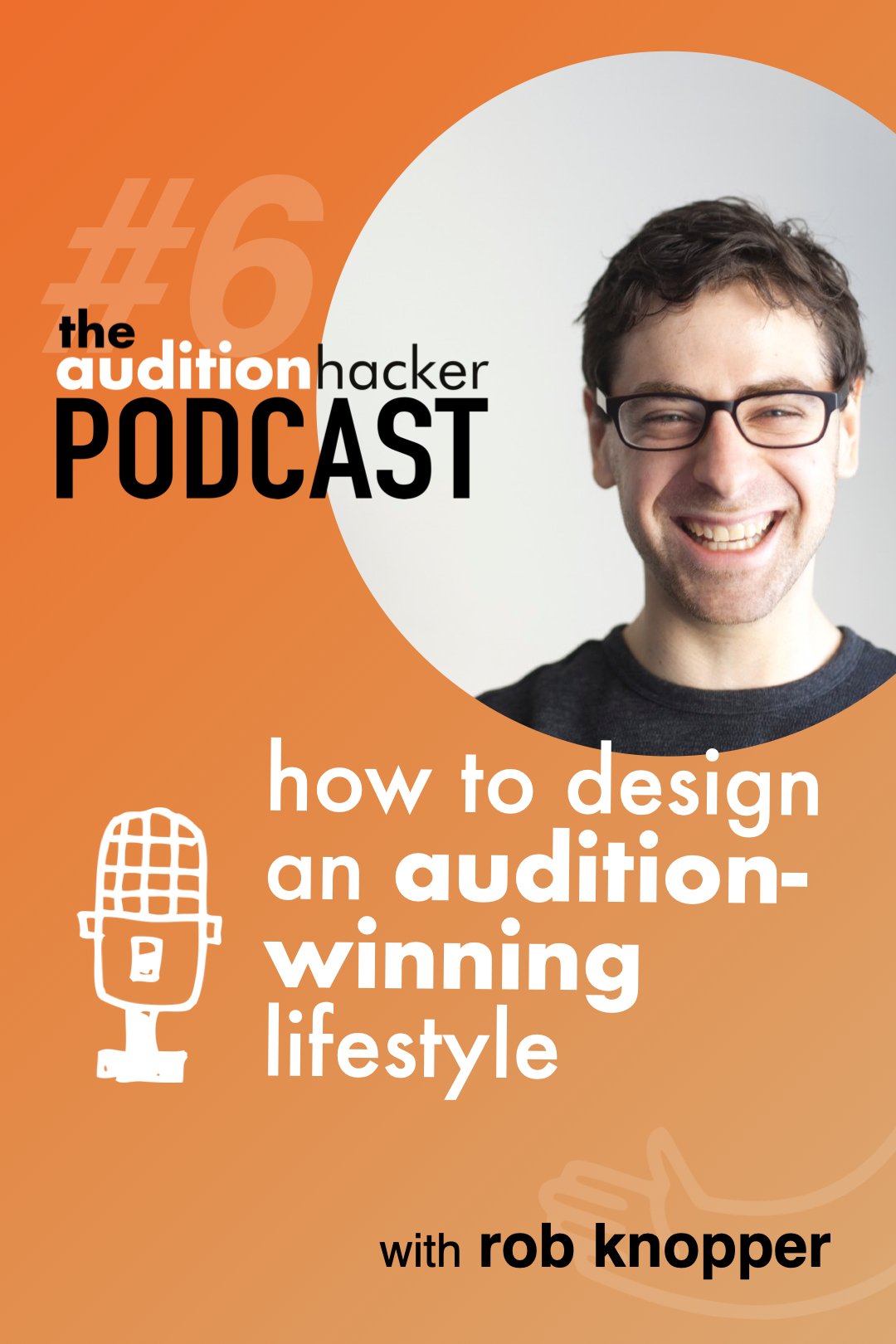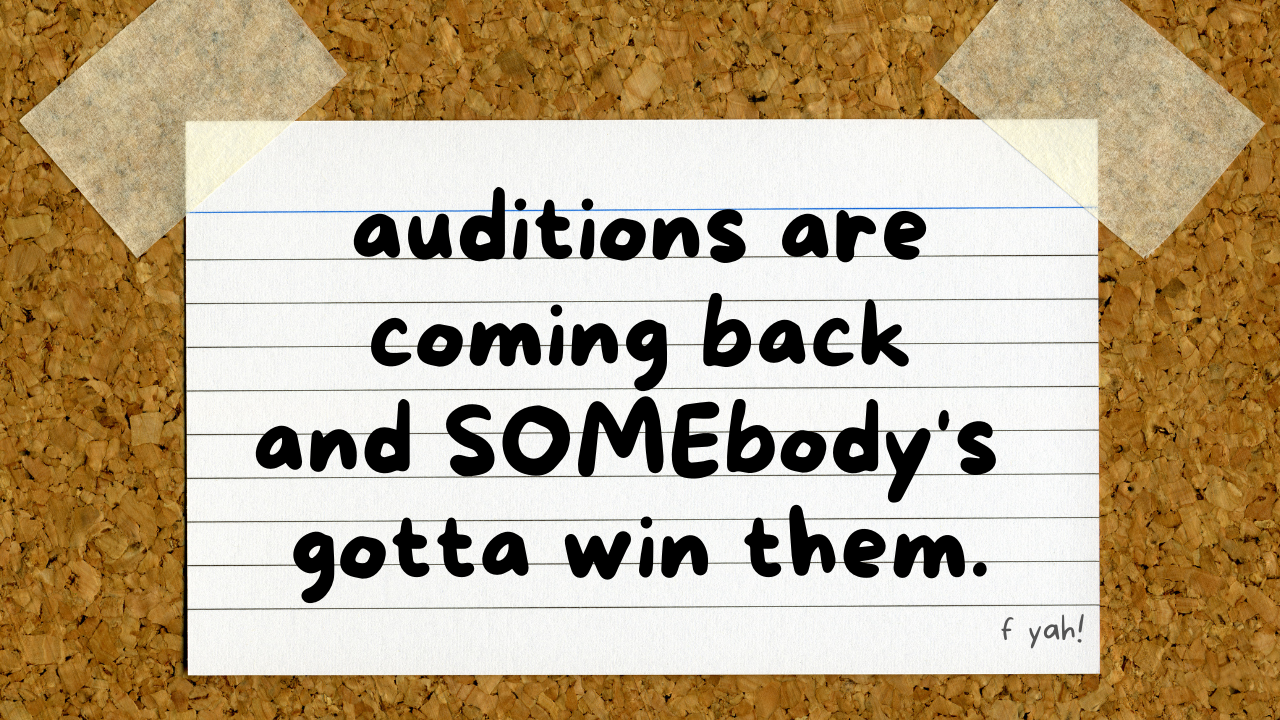download the free college audition checklist pdf
a complete guide (and downloadable checklist!) for rising seniors getting ready for their college audition journey.
firstly, i wanted to say OH MY GOD! i’ve been receiving so many kind words from people finding these blogs useful. thank you so much for reading.
secondly, i’ve received hundreds of messages from people from around the globe asking me to write about all sorts of topics. i have many blogs in the pipeline based on your prompts and questions, and so i’m going to try to credit you if it was your idea.
if you have a question or if you want me to address a topic, someone on the auditionhacker team will always answer every email we get. if you download the college decision checklist, available here, you'll also be signed up for the email list. shoot me an email with your idea. i can't answer every question but i'll try to answer as many qualified questions as i can get to.
today’s post is from kellen fenton. kellen said, “a while ago you mentioned the idea of choosing a college based on the professor, but that the topic of choosing what college to go to was "a topic for another time.” …i was wondering if you were just mentioning it or if that might be a post we see in the future? as a junior in high school I can say that choosing colleges is my #1 focus right now"
ok kellen, i hear you. here goes:
how to choose a college for music
if you’re a rising senior, your college decision process is the #1 thing on your mind. rightfully so - it’s the most important decision you’ll ever make for your musical education. there are a bunch of projects that you have to do simultaneously, and so it’s hard to figure out how to stay on track and make sure everything gets done. so i put together a guide on what you should be doing during each part of the year, from the summer before your senior year through the may 1st deadline to make your final college decision.
different projects, all happening at once
the college audition process is two simultaneous major projects that you have to go through at the same time. the first is that you are preparing your audition to compete against other students and earn a spot at the schools of your choice. this is the school's way of finding the best students and offering them positions: you are auditioning for the school.
but the other is that you're pitting schools against each other in fierce competition to earn the position on your list for the school that you'd most like to attend. the school has to audition for you.
you have a ton of control over both of these projects, and you'll have to do them at the same time. in fact, you can use that to your advantage in different ways. i'm going to talk more about the concept of pitting schools against each other next week, but today i'm talking about the nuts and bolts - what exact things do you have to do every step along the way to stay on the right track?
a college audition checklist.
a downloadable to-do list for each period of time between now and your college audition.
to help you with your college decision process as much as possible, i created this checklist. it includes a timeline and to-do list for each time period of your college audition journey. you can download this, print it out, and keep it by your computer throughout your college audition journey. that way, you won't miss anything along the way.
the guiding principles that will yield the best result
i chose colleges the way i do everything: thoroughly, meticulously, comprehensively, and obsessively. it was all i thought about during my entire senior year of high school. i followed some guiding principles when i was choosing my own college, which are the following:
learn as much as you can about each school.
choose your audition repertoire that showcases your strengths and strikes a balance between ‘easy to play well’ and ‘impressively difficult.’
practice to win by being thorough and methodical (and a little bit obsessive).
be selfish: this decision affects you the most, not the prospective teacher, your parents, the school, or anyone else.
the college audition journey timeline (from the pdf)
1. june through august: research and planning
you’ll begin by making a huge list of all the possible schools that you would consider going to, and learning as much as you can about them. remember: you’re choosing schools that can help you achieve your goals, not vice versa, so this is also the time to start looking inwards and considering your own requirements for school.
2. september through november: college visits and practice
college visits are an essential part of making an informed decisions about schools. don’t skimp on these visits - they will cost much less than a semester of tuition and your decision is too important to make without learning all the facts. also, choose your audition repertoire at the beginning of the school year (~september 1st) and start practicing immediately.
3. december through february: practice and prepare for auditions
you’ve set yourself up with auditions at the finest schools that would be most perfect for you. give yourself a fighting chance to earn a spot at those schools by throwing yourself into practicing. be pro-active and do more practicing than you’ve ever done before. try new techniques like recording yourself, mock auditions, and playing for as many people as possible.
4. february through may: wait for results and make your decision
now’s the hard part: waiting. after you start receiving decisions from schools, keep referring to your pros and cons list. you also may experience the phenomenon of having pressure from teachers to make a decision early. the teachers are trying to attract the best students. if you say no, they have to go to their number 2. if you wait a long time to say no, their number 2 will have already committed, so they’ll have to go to number 3. keep your perspective on this: that’s their problem, not yours. this is the most important decision that you’ll ever have to make in your musical education, so don’t be pressured by admissions departments. they are constantly trying new tactics, like offering special perks to students who sign up early, so be wary and insist (respectfully) to have as much time as you need to make this decision.
the #1 factor to consider when choosing a school
sure, you need to choose a college. and you need to put yourself in a great position to be chosen by a college, through the audition process. but... why are you going to choose one college over another? what do you actually want out of college? these questions should get you looking inward and soul-searching, and that should be happening constantly throughout the entire college decision and audition process. every time you narrow your list down and cross off a school, it should be because that school doesn't fit your requirements, for one reason or another.
when i was choosing schools, i decided to start listing things that i wanted to get out of school. to do that, i had to think about what my career and life goals were. after all, school is essentially an educational service that you can hire for self-improvement. it’s the school’s job to prove that it can offer you what you need, not the other way around.
what kind of musician did i want to be? what kind of career did i want to have? how could i get there in the best way possible?
here’s what i knew about myself:
i wanted to be an orchestral musician, either on timpani or percussion, and to get a job in a stable, well-paying union orchestra.
i didn’t know whether i was going to be a timpanist or a percussionist, so i needed to be on track for both.
i wanted to be a well-rounded musician, and have lots of other skills and projects going on constantly through school and beyond. these were things like drumset, jazz vibraphone, composition, arranging and orchestrating, which were all things that interested me.
i wanted to have the best teachers that i could learn incredible things from.
and that’s all i knew. i’ll summarize it this way - i was looking for an elite school that offered three components: percussion, timpani, and “other.” this was a conclusion that i slowly formulated, and it informed my decisions, questions, and everything else along the way.
for you, you'll need to figure out answers to the following:
what are the requirements that you absolutely must have in a school? (i.e. there must be an orchestra program. or, the teacher must be in a professional orchestra. or, maybe you need to be able to take a jazz piano class on the side.)
what do you want to achieve from school? (i.e. a world-class level of performance. or, a well-rounded education with ethnic, jazz, rock, and classical influences.)
what aren't you prepared to decide on that you need to keep flexible? (i.e. i don't know if i want to do music performance or music education, so i need to choose a school that has great programs for both of those majors. or, i play with french bow and this teacher teaches german bow, so i need him/her to be flexible and allow me to change or continue playing this way depending on how it goes.)
(erm... bass reference.)
the 3 categories of schools
how to narrow down your list of schools and have great choices no matter how your auditions go
there are a ton of schools out there. there are conservatories, state universities, small schools, big schools, hippie middle-of-nowhere schools (looking at you oberlin), and huge powerhouse schools (cough cough...indiana). if you play one of the major musical instruments, you'll have literally hundreds of choices. there are a lot of great choices. but they all have different specialties and different reputations, and those differences depend on the teachers, the school culture and history, and plenty of other things.
they also expect their students to play at different levels, depending on how exclusive the school is. juilliard has a 6.7% acceptance rate, berkley school of music has a 34% acceptance rate, and there are plenty more state and regional schools with higher and lower acceptance rates. it's all over the map. that means that it's going to take a more impressive audition to get into some schools than others.
it's very difficult for people to correctly identify how well they're going to do at particular auditions. it's nearly impossible. if you just started playing your instrument, there's probably not a high chance that you'll make it into curtis, which is the nation's most selective conservatory at 4%. i recommend keeping a range of schools on your list so that no matter how high you 'place' in the auditions, you'll have researched and decided the best school at that level for you. in fact, i recommend applying for three categories of schools:
"reaching" schools that are at the top of your list and are a little higher than you think you can get into,
"solid, mid-level" schools that would be excellent and you have a very decent chance of getting into, and
"backup" schools that you can be almost positive you'll get into.
you should have at least 2 schools in each of these categories. that way, no matter what level the audition panels perceive you to be, you'll have the best possible school in that category according to the requirements and specifications that you outlined during your process.
the teacher is the most important factor.
the teacher is the person who is going to have the most influence over your life during college and in the future. you definitely have to meet and take a lesson with the teacher before you would ever consider going to school there. you should be learning as much as you can about the teacher, directly by taking a lesson and indirectly by talking to people, reading about them, and talking to peers.
to start with, you should make contact with them and let them know you’re interested. talk to them about next year and ask them some questions:
how many students are in the department and how many students do you have?
how much time do you spend with your students outside of lessons each week?
what would we work on next year?
do i study with grad students or do i always get lessons with the faculty?
do students get a lot of practice time at the school?
the answers to these questions are important, but more important is that you're observing the teacher's interest in you as a student. you’re testing them. you need to see how interested they are in getting you to go to their school, and how motivated they are to spend time on you, a motivated prospective student. do they have 10 word answers? do they have 2 paragraph answers? if you were trying to hire somebody to work at your company for 4 years, you’d notice every single communication - the resume, how prompt with their emails or calling you back, and you’d notice how enthusiastic they’d seem in the job interview.
you've got to take a lesson with them. is this someone you actually want to work with? this is a really good way to choose a teacher. of course you have to do the audition for them, and you have to prove to them that you’re the highest quality student that they can find. but more importantly, college is for you. you have to figure out if you actually want them to be your teacher. try to keep your perspective and look beyond their name, title or reputation. through all of your interactions, you want to find out if this is going to be a positive relationship, and if it's going to be helpful and motivating throughout the next 4 years for you.
how to do a college visit the right way
once you’ve made your list, start planning college visits for the fall. a physical visit to each college that you're seriously considering is extremely important. remember, this is the school that you're going to put your trust in to take you from point A to point B. it's the institution that you're hiring to train you to have the life and the job you want. that's why it's not a decision that you make from the comfort of your home. you have to go there and experience it as fully as you possibly can. you should definitely plan a trip of at least two days at each college.
1. take a lesson with the teacher.
this is the most important thing to do at your visit. if you can’t do this, it’s almost not worth auditioning. if you can’t take a lesson with the teacher, you can’t know whether that college will be good for you.
2. sit down with a student.
ask the teacher if you can meet a student. this is a very common thing to do. take them out to lunch - college students always need more food. ask them everything you can. have a list of questions for them. these questions would be things like (1.) how much do you get to practice? (2.) what do people spend their time doing? ask them about what their goals are, why they chose that college, what lessons are like, and start to get an idea of if they’re happy there. ask them what their goals are and why they chose that school.
in my experience, the student that you're paired with will be sort of a spokesperson for that department. they'll be extremely positive and optimistic about the school, which is why they were chosen to sit down with you. you’ll probably leave thinking, “wow, i have to go here. i should probably just cross everything else off my list besides this place.” fine - i’ll just caution you that that might happen 3 or 4 times. these colleges work really hard to get people to go there (and pay tuition). that’s their main job.
3. take a tour of the college.
do everything you can to really feel like you go there during that weekend. if you know someone there, stay in their dorm room. you want to get the most immersive experience you can. specifically, you want to feel not only what are the specifications of the school on paper, but what it’s actually like for students. do they look busy or stressed out? lazy or bored? is there an x factor, and does the x factor work with you?
what to do first:
start planning. download my timeline and checklist, and start
planning out this project from scratch.














in 2019, a cellist named maria reached out to me about her audition struggles. on paper, she was the “worst audition candidate ever” (her words). she had 2 small children, a full-time teaching job, and hadn’t taken an audition in 4 years.